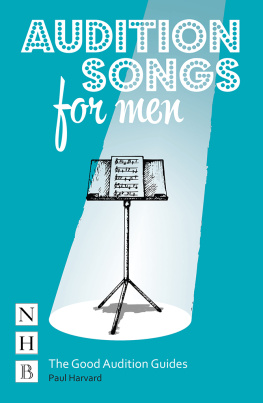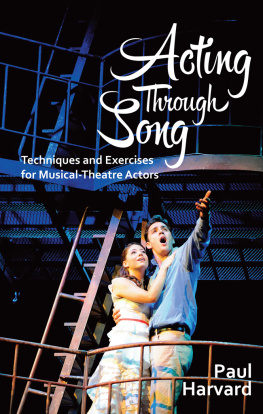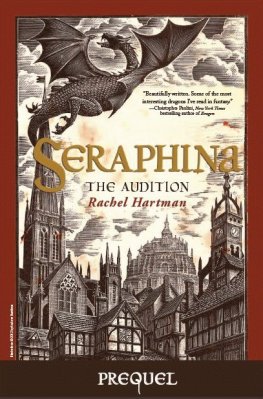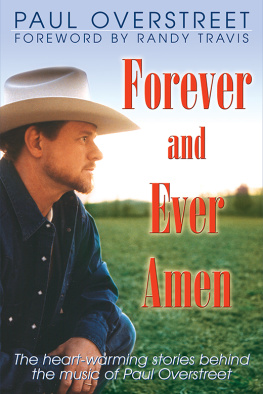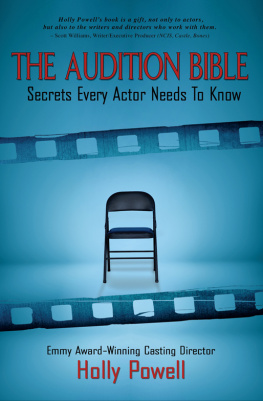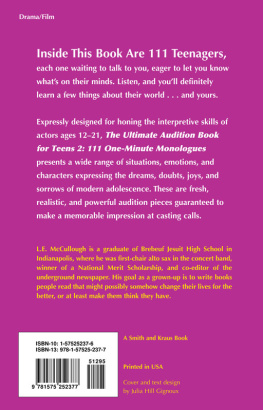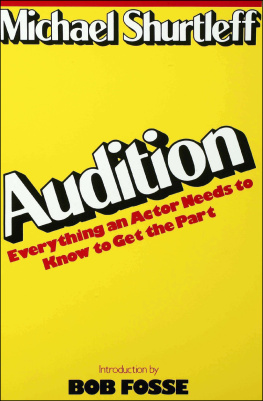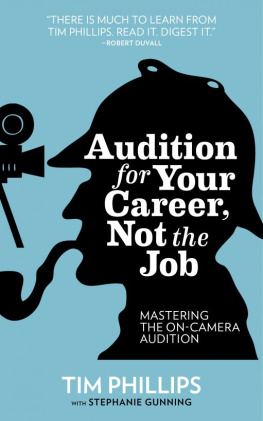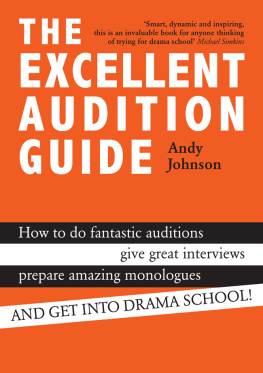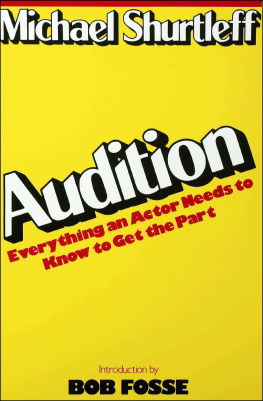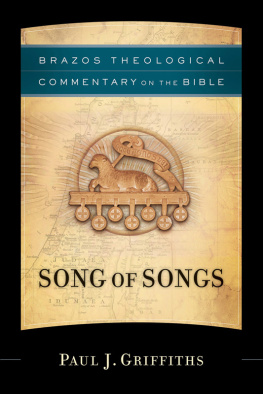Paul Harvard - Audition Songs for Men
Here you can read online Paul Harvard - Audition Songs for Men full text of the book (entire story) in english for free. Download pdf and epub, get meaning, cover and reviews about this ebook. year: 2020, publisher: Nick Hern Books, genre: Children. Description of the work, (preface) as well as reviews are available. Best literature library LitArk.com created for fans of good reading and offers a wide selection of genres:
Romance novel
Science fiction
Adventure
Detective
Science
History
Home and family
Prose
Art
Politics
Computer
Non-fiction
Religion
Business
Children
Humor
Choose a favorite category and find really read worthwhile books. Enjoy immersion in the world of imagination, feel the emotions of the characters or learn something new for yourself, make an fascinating discovery.
- Book:Audition Songs for Men
- Author:
- Publisher:Nick Hern Books
- Genre:
- Year:2020
- Rating:5 / 5
- Favourites:Add to favourites
- Your mark:
- 100
- 1
- 2
- 3
- 4
- 5
Audition Songs for Men: summary, description and annotation
We offer to read an annotation, description, summary or preface (depends on what the author of the book "Audition Songs for Men" wrote himself). If you haven't found the necessary information about the book — write in the comments, we will try to find it.
Audition Songs for Men — read online for free the complete book (whole text) full work
Below is the text of the book, divided by pages. System saving the place of the last page read, allows you to conveniently read the book "Audition Songs for Men" online for free, without having to search again every time where you left off. Put a bookmark, and you can go to the page where you finished reading at any time.
Font size:
Interval:
Bookmark:
The Good Audition Guides
FOR MEN
PAUL HARVARD

NICK HERN BOOKS
London
www.nickhernbooks.co.uk
PART ONE:
THE KNOWLEDGE
About This Book
WHO IS IT FOR?
If you need to sing in an audition, then this book is for you. It is an easy-to-use, accessible resource that will help you discover the perfect song choice no matter what your audition needs. You might be applying for a vocational musical-theatre course, or a place on a performing-arts degree. If so, this book will help you find a first-rate, distinctive song that shows off your voice and reveals your full potential. Or you might have an audition for an acting programme. If singing is not your first skill, you will want to find a song that sits comfortably in your range that you feel confident with but that also highlights your strengths as an actor. The songs you need are identified inside. The book can assist you if you are auditioning for a school production, or for a youth drama group enabling you to find the song you need to land the role you want. Finally, this book is an invaluable tool if you are already in vocational training, or are a professional actor. It will help you broaden your understanding of the musical theatre repertoire so you can continuously develop your portfolio of songs, and is a great resource when you need to find the right material for a last- minute casting.
WHAT IS INSIDE?
The book explores fifty songs that have been carefully selected because they work particularly well in audition. For each song there is a detailed, bespoke self-rehearsal guide. These guides contain the sort of information you would receive from sessions with a vocal coach and a director providing you with the professional expertise and technical advice you need to deliver a high-quality performance. Each guide is like a singing lesson and an acting class rolled into one.
The self-rehearsal guides begin by describing what are commonly known as the given circumstances of the song (see ) are discussed to open up possibilities for the sort of acting choices you might play. The pivotal dramatic moments of the song, called events, are pinpointed where appropriate and acting tips are provided to help you shape your overall performance.
Alongside the investigation of the acting content, the self- rehearsal guides explore how to tackle the songs from both a musical and vocal perspective. A recommended recording of the song is suggested for you to listen to that can help you learn the music accurately and understand the correct vocal style. This is particularly useful if you dont have access to a singing teacher who can help you learn the music. The vocal range and original key signature of the song are identified, and your choice of accent is discussed. At times, cuts are also suggested, as you will need to shorten some songs for audition. Finally, the guides offer advice on how to deliver the songs vocally and musically. For those looking to deliver a more advanced-level performance, perhaps for a drama-school audition or a professional casting, the technical set-ups and vocal delivery required for the song are examined. These provide an overview of the musculature you should use to ensure your vocal performance is healthy, repeatable, dynamic and stylistically accurate. The technical language in this book is heavily reliant on the work of Jo Estill, the American voice specialist, who died in 2010. The Estill method is a very useful system because it is anatomically specific. It allows you to understand, feel and recreate the precise muscular patterning needed to achieve the different sounds used in musical theatre. In particular, this book frequently references Estills work on voice qualities (see ), such as Twang and Belt. Advice is also given on musical decisions, such as dynamics and phrasing.
At the end of each guide you will find directions to a suggested website where you can purchase the correct sheet music for the song, as, for copyright reasons, the music and lyrics cant be included in this book.
ADDITIONAL SUPPORT
To support the specific detail of the self-rehearsal guides, at the beginning of the book there are three extended chapters that contain overarching advice that will help you to prepare, rehearse and perform any of the songs. The first chapter provides definitions for the acting, singing and musical terminology you will encounter in the book. The second contains a series of easy-to-follow acting and singing exercises that will help you to improve your vocal delivery, and to produce a truthful and spontaneous performance of the lyric. The final chapter provides advice about audition technique. It deals with issues like making a good impression when entering the room, communicating musical instructions to the pianist, singing to a panel, and responding to redirection.
CHOOSING A SONG THAT SUITS YOUR VOCAL RANGE
The first factor you need to consider when choosing a song for any audition is: Does it suit my vocal range? The song material in this book is divided into two sections: Tenor/High Baritone and Baritone/Bass. The first section is generally for men with higher voices, the second for those who mainly have a deeper sound. These terms Tenor, Baritone and Bass categorise a singer not only by their pitch range, but also reflect where their voice has the best timbre, where it sits most comfortably and resonantly. Modern vocal training allows all singers to expand their upper ranges through exercise. So as a baritone, for example, you may find you are able to sing higher than some tenors but are still classed as a baritone because your voice sounds best in a lower register.
Because of these anomalies, you may find that, if you are a baritone, some of the songs on the Tenor/High Baritone list may also work for you. Equally, if you usually sing tenor, you might find songs on the Baritone/Bass list that you can use. Therefore, to aid you with your decision-making, each song has its precise vocal range outlined in the self-rehearsal guide. If you dont know your own vocal range, it is worth asking a friend or teacher who plays the piano to check this with you. Typical vocal ranges for the four voice types are as follows:
Tenor: C3 to C5
(one octave below middle C to one octave above middle C)
High Baritone (sometimes called Baritenor): A2 to C5
(the second A below middle C to one octave above middle C)
Baritone: A2 to G4
(the second A below middle C to the G above middle C)
Bass: E2 to E4
(second E below middle C to the E above middle C)
TRANSPOSING SONGS
Sometimes actors consider transposing a song into a lower key if it is too high for them. Whilst many sheet-music websites which sell the music you will need for your audition offer this facility, it is not something to be recommended. An experienced audition panel who will know the repertoire well are able to tell if you are not singing your song in its usual key. If you change the key signature of a song so you dont have to sing the high G, they will assume it is because you cant. You may as well enter the audition with a placard saying: I cant sing above an F ! Therefore you are well- advised to choose a song you can deliver in the original key which is indicated in the self-rehearsal guides in the vast majority of circumstances.
! Therefore you are well- advised to choose a song you can deliver in the original key which is indicated in the self-rehearsal guides in the vast majority of circumstances.
A final point to consider when thinking about range is ensuring that your chosen piece doesnt stretch you to breaking point. For a song to be advisable you need to be able hit the top note when you are nervous, feeling a bit off-colour, and at nine oclock in the morning. Dont select a song if you can only deliver the big belt when you are feeling on top form, have your fingers crossed, and the wind is blowing from the south-west!
Next pageFont size:
Interval:
Bookmark:
Similar books «Audition Songs for Men»
Look at similar books to Audition Songs for Men. We have selected literature similar in name and meaning in the hope of providing readers with more options to find new, interesting, not yet read works.
Discussion, reviews of the book Audition Songs for Men and just readers' own opinions. Leave your comments, write what you think about the work, its meaning or the main characters. Specify what exactly you liked and what you didn't like, and why you think so.

